
Willem de Kooning Woman 1969

“Anyone who loves freedom owes such a debt to the Red Army that it can never be repaid”
-Ernest Hemingway, 1942
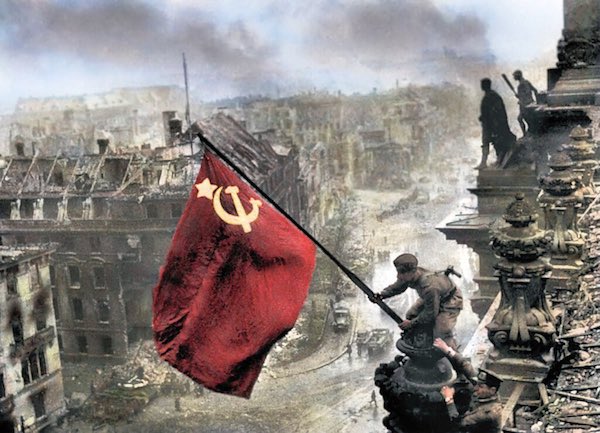

Tucker
I’m with Tucker. Time to boycott Fox until they come to their senses and let the man speak. pic.twitter.com/dvrNlLdvgW
— Brett Favre (@BrettFavre) May 8, 2023

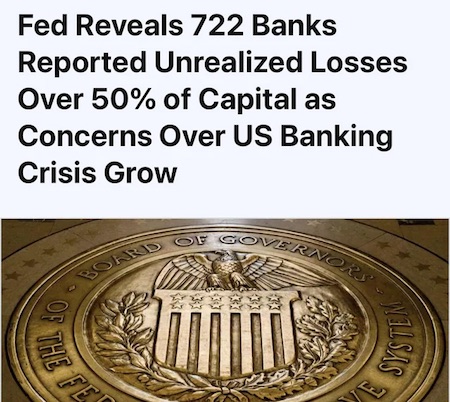

CNN mask
You have to see this new 30 second CNN ad. You’ll love it. pic.twitter.com/niYrF5NJ4P
— Steve Kirsch (@stkirsch) May 9, 2023

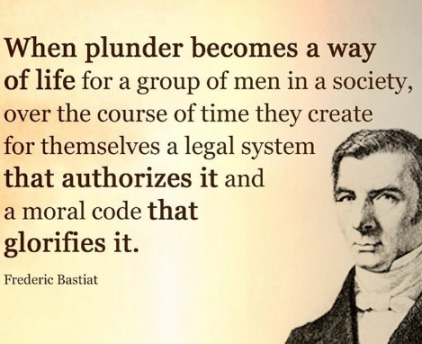

Brownsville TX
NEW: Remarkable video from our Fox drone team shows an enormous line of hundreds of migrants who just crossed illegally into Brownsville, TX this evening. A large majority of them are single adults. The RGV continues to see a massive surge of illegal crossings ahead of T42 drop. pic.twitter.com/xHDV8sc8PD
— Bill Melugin (@BillFOXLA) May 8, 2023



Italy society
https://twitter.com/i/status/1655594159955234822


“..chairman of the NATO Military Committee between 2015 and 2018..“
• West Must Be Ready For Unfavorable Outcome In Ukraine – Czech President (RT)
The conflict between Russia and Ukraine may not end in victory for Kiev, and its Western backers should prepare for such an outcome, Czech President Petr Pavel has told The Guardian newspaper. “I think we should do anything… at our disposal to encourage Ukrainians and to support them to be successful. But internally, we should also be ready for other contingencies,” said Pavel, who was in London for the coronation of King Charles III. A lot will depend on the outcome of Ukraine’s planned spring counteroffensive, explained the Czech leader, who has a background in intelligence and served as chairman of the NATO Military Committee between 2015 and 2018. Kiev shouldn’t “underestimate the Russians because they have enough manpower, they still have enough equipment,” he added.
“And of course, being in defense makes it easier for them because Ukraine will have suffered terrible losses, even if they are well prepared. So attacking an enemy like Russia will be difficult and Russians will not be caught by surprise.” The Czech president, who visited Kiev with his Slovak counterpart Zuzana Caputova in late April, said Ukrainian President Vladimir Zelensky had been asking them for ammunition. Those in Kiev believe they still don’t have everything they need to launch the counteroffensive, he added. There “might be a temptation to push them, for some, to demonstrate some results,” but the Ukrainians must be allowed to fully prepare for the assault on Russian lines, Pavel warned. “It will be extremely harmful to Ukraine if this counteroffensive fails, because they will not have another chance, at least not this year,” he stated.
In late April, Zelensky assured foreign journalists that the “counteroffensive will happen” and expressed hope that it would be successful. Ukrainian Defense Minister Aleksey Reznikov also said Kiev’s troops were “generally ready for the push” and were only awaiting orders from senior officials. However, a report by Politico a few weeks ago claimed that Ukraine’s prime backer, the US, had concerns that the impact of the counteroffensive could fall short of expectations. Russia, which has been building fortifications along the frontline for the past six months, has been saying that it’s ready to repel the attack. Russian Deputy Foreign Minister Mikhail Galuzin warned last week that the counteroffensive would have “deplorable consequences” for Kiev.

Shameful because:
• Russia liberated Ukraine too.
• 1.6 million Jews were executed in Ukraine
• Ukraine To Celebrate Europe Day Instead Of Victory Day (TASS)
On Monday, Ukrainian President Vladimir Zelensky signed a decree on celebrating Europe Day on May 9 in the country. “[Hereby to] establish Europe Day in Ukraine, which is celebrated annually on May 9 together with the states of the European Union,” the text of the decree, published on the website of the Ukrainian head of state, says. In Zelensky’s video message, published on his Telegram channel, he also indicated that from tomorrow, Europe Day will be celebrated annually in Ukraine. On May 8, Zelensky proposes to celebrate the Day of Remembrance and victory over Nazism in World War II. For many years, the Ukrainian authorities have tried to eradicate the celebration of Victory Day.
Until today, on May 9, Ukraine celebrated the Day of Victory over Nazism in World War II, which replaced the Day of Victory over fascism in the Great Patriotic War of 1941-1945, and on May 8, Ukraine celebrates the Day of Remembrance and Reconciliation. These changes were approved by the Verkhovna Rada in 2015 as part of the implementation of the decommunization policy. Since that time, the red poppy has become a symbol of victory for the Ukrainians in the European manner. Although May 9 remains a day off, the Ukrainian authorities do their best to prevent the celebration of Victory Day. For the St. George ribbon, citizens face criminal or administrative liability. Last year, Zelensky and the Ukrainian Defense Ministry published a congratulation on May 9, attaching to it a photograph of a Ukrainian soldier with an emblem similar to the symbol of the SS Totenkopf division.
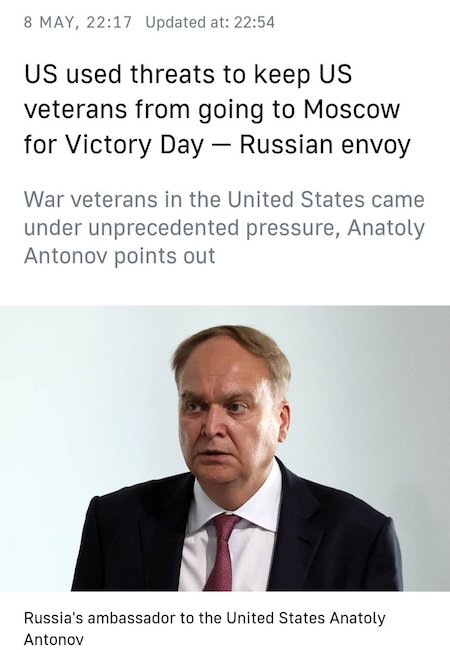

“..Maria Zakharova branding Zelensky a “traitor” and the “new incarnation of Judas in the 21st century.”
• Ukraine Cancels Traditional Holiday Celebrating Defeat Of Nazis (RT)
Ukraine may break the Soviet tradition of celebrating Victory Day on May 9 after President Vladimir Zelensky suggested holding commemorative ceremonies on May 8 instead. The idea was quickly slammed by officials in Moscow. In a message on his Telegram channel on Monday, Zelensky explained that his proposal was based on the fact that it was “on May 8 that most nations of the world remember the greatness of the victory over the Nazis.” He added that the German Third Reich’s unconditional surrender was signed on that day. Zelensky said he had submitted a bill to the country’s parliament which, if passed, would officially designate May 8 as the ‘Day of Remembrance and Victory over Nazism in the Second World War of 1939-1945’.
As for May 9, which is when Victory Day was traditionally celebrated in the Soviet Union, Zelensky declared this would now be observed as Europe Day, as it is in the European Union. He expressed confidence that the changes would help align Ukraine with Europe and return to “honest history without ideological admixtures to our state.” According to the proposed bill, May 9 would cease to be a public holiday, while May 8 would become one. The Ukrainian President also compared modern day Russia to Nazi Germany, saying it represented a “similar evil” and insisting Ukraine would prevail in its conflict against Moscow in the end. Lawmakers in the Verkhovna Rada have already indicated their readiness to quickly adopt the new piece of legislation promptly.
The head of the ruling party’s parliamentary group, David Arakhamia, wrote on his Telegram channel on Monday that he and his colleagues would begin working to “speedily adopt” the bill. The move has been condemned in Russia, with Foreign Ministry spokeswoman Maria Zakharova branding Zelensky a “traitor” and the “new incarnation of Judas in the 21st century.” In a post on her Telegram channel, the official argued that the Ukrainian president had “forever betrayed his ancestors,” who fought against the Nazis. “Fascist collaborator 80 years later,” she concluded. Kremlin spokesman Dmitry Peskov, said he believed May 9 would remain a sacred day for many Ukrainians no matter what.
VIDEO: Ukrainian President Volodymyr Zelensky vows that Russian forces will be defeated in Ukraine like Nazi Germany was beaten in World War II, commemorating Victory in Europe Day. pic.twitter.com/gZnjy82yRz
— AFP News Agency (@AFP) May 8, 2023

“This statement by Mr. Budanov once again confirms the correctness of President Putin’s decision to launch a special military operation..”
• Kremlin Calls Ukraine’s Words On Readiness To Kill Russians “Monstrous” (TASS)
Statements by the Ukrainian authorities about their readiness to “kill Russians around the world” indicate that Kiev has become not just a sponsor, but an immediate organizer of terrorist acts, Kremlin spokesman Dmitry Peskov told reporters on Monday. He was commenting on the corresponding statement of the head of the Main Intelligence Directorate of the Ministry of Defense of Ukraine Kirill Budanov. “This is a truly monstrous statement. This statement, and what Mr. Budanov said, is a direct confirmation that the Kiev regime is not just sponsoring terrorist activity, but is an immediate organizer of this activity. This statement gives another very important characteristic of the Kiev regime,” the Kremlin spokesman said.
He stressed that Russia strongly condemns such statements. “We have special services that will do everything they must amid such statements. No one should have any doubts about this,” the Kremlin spokesman warned. Kremlin believes that the West should not disregard such statements. “Today we will closely monitor the reaction of European capitals, as well as Washington – especially Washington – because it is very difficult to imagine that such terrorist statements from Kiev can remain without condemnation. Therefore, today we will wait for these condemnations,” Peskov said. “This statement by Mr. Budanov once again confirms the correctness of President Putin’s decision to launch a special military operation,” he added.

More sanctions. They haven’t learned a thing.
• EU Plans To Punish China For Trade With Russia – FT (RT)
The European Union is seeking to tighten the economic screws on Russia by sanctioning Chinese companies that conduct trade with Moscow, the Financial Times reported on Sunday. Seven Chinese businesses have been named in a new package of restrictions that the EU member states will discuss this week, the report says, citing a copy of the sanctions list seen by the paper. According to the FT, the list includes two mainland Chinese companies, 3HC Semiconductors and King-Pai Technology, and five from Hong Kong, including Sinno Electronics, Sigma Technology, Asia Pacific Links, Tordan Industry, and Alpha Trading Investments.
The businesses have reportedly been accused of selling equipment that could be used by Moscow in weapons manufacturing. Some of these companies have already been placed under sanctions by the US. The European Commission believes it is “appropriate” to target certain entities “in third countries involved in the circumvention of trade restrictions” against Russia, the FT quoted the sanctions proposal as saying. To take effect, the new sanctions need to be unanimously approved by all 27 EU member states. Until now, the FT noted, the EU has avoided targeting China, saying there was no evidence that Beijing was directly providing weapons to Moscow. The EU has so far imposed 10 rounds of economic sanctions against Russia over its military operation in Ukraine.
The EU’s chief diplomat, Josep Borrell, admitted last month that the bloc had nearly exhausted its options for punitive measures against Moscow. Since then, it has been reported that EU lawmakers are considering targeting third countries that re-export goods to Russia, thus helping Moscow to circumvent trade restrictions. China is insisting on a diplomatic solution to the Ukraine conflict, and proposed a 12-point peace plan in February, calling for the security concerns of each side to be addressed. Josep Borrell dismissed Beijing’s proposals last week as “wishful thinking” and insisted that any peace plan must be based on Kiev’s demands.

“..Beijing will be forced to resolutely protect its rationally justified legal rights.”
• China Threatens EU With Countermeasures Over Possible Sanctions (TASS)
China will protect its interests in the event of EU sanctions against seven Chinese technology companies due to their supply of equipment to Russia, the Chinese Foreign Ministry’s spokesman Wang Wenbin announced on Monday. “If media reports turn out to be true, <…> such actions by the European side will seriously undermine mutual trust and cooperation between the EU and China,” he stressed at a briefing. When asked to comment on the information that seven Chinese companies could soon come under EU sanctions due to the supply of equipment to Russia he replied: “The European side should not make a mistake, otherwise Beijing will be forced to resolutely protect its rationally justified legal rights.”.

“We are not going to join the unilateral sanctions imposed against Russia by the US and the EU. Our own benefit and prosperity come first..”
• Türkiye Reiterates Stance On Russia Sanctions (RT)
Ankara has no plans to support the Western economic restrictions against Russia, foreign minister Mevlut Cavusoglu said in an interview on Monday. Türkiye’s top diplomat made the comments to the Lider Haber TV channel in the run-up to the country’s presidential and parliamentary elections, due to take place on Sunday. “We are not going to join the unilateral sanctions imposed against Russia by the US and the EU. Our own benefit and prosperity come first,” Cavusoglu explained, as quoted by the TASS news agency. The minister also criticized the opposition presidential candidate Kemal Kilicdaroglu, who has said he would give priority to developing ties with the West. According to Cavusoglu, the rival to incumbent president Recep Tayyip Erdogan has shown himself to be inconsistent in his statements; at one rally, Kilicdaroglu reportedly said that nothing would endanger the relationship between Türkiye and Russia.
Reports emerged in March of Türkiye blocking some transit shipments destined for Russia, in response to recent pledges by Brussels and Washington to enforce anti-Russian sanctions and to stop the supply of sanctioned products via third parties. Türkiye’s Ministry of Trade provided no official confirmation of the move. It was later reported that Ankara had resumed the transit to Russia of some sanctioned goods of European origin. The EU has repeatedly voiced concern about the country’s refusal to participate in Western sanctions against Russia, and accused the Middle Eastern state of becoming a ‘transit hub’ for Russia, thus enabling the economic blockade to be circumvented.
Ankara is one of Moscow’s main trading partners, with both sides having pledged to deepen economic cooperation and expand bilateral trade. Last year, Türkiye and Russia signed a roadmap for economic cooperation that envisages bringing bilateral trade turnover to $100 billion a year. The two have also agreed to introduce the Russian ruble as a settlement currency for bilateral trade, including for Russian natural-gas supply. Data shows that, around this time last year, Türkiye became one of the top five exporters to Russia. In 2021, it ranked 11th, ahead of the US, France, Japan, Poland and Italy.

“This war will not end with positional gains, but with a new security agreement between the two global blocs..”
“This war is not between Russia and Ukraine, but between Russia and the Western bloc. Cold War 2.0..”
• Russia’s Deal With West Is Key To Ukraine Conflict End – Erdogan Aide (RT)
The conflict between Moscow and Kiev is effectively a conflict between Russia and the collective West and so it can be resolved only by reaching a “strategic agreement,” Ibrahim Kalin, a top Turkish presidential adviser on foreign policy, believes. “This war will not end with positional gains, but with a new security agreement between the two global blocs,” Kalin said during an interview with Haberturk TV on Sunday. The official said he discussed the issue and Moscow’s stance on it with Russian President Vladimir Putin during his recent visit to Russia. While Türkiye itself has been working towards reaching the “perspective” of such an agreement, the current “international climate is in favor of war rather than peace,” Kalin admitted. “The great powers want this war to continue,” he added, without naming the purported pro-war actors.
The ongoing conflict between Russia and Ukraine has become a “hot” episode of a broader conflict between Moscow and the collective West, Kalin explained, describing the standoff as the“Cold War 2.0.” While Russia apparently tried to avoid hostilities when it tabled a comprehensive security agreement shortly before the conflict broke out, the West rejected it, Kalin noted. “This war is not between Russia and Ukraine, but between Russia and the Western bloc. Cold War 2.0,” he stressed. The position voiced by Kalin appeared to be reminiscent of statements repeatedly made by Russia’s top officials, who repeatedly described the ongoing hostilities as a proxy war between Russia and the West, merely waged at the hands of Ukrainians.
The stance was reiterated by Russian Foreign Minister Sergey Lavrov on Friday, with the top diplomat stating that any negotiations would not be held “with [Ukrainian President Vladimir] Zelensky, who is a puppet in the hands of the West, but directly with his masters.” Amid the broader conflict between Russia and the West, Türkiye has asserted itself as a mediator, with Ankara hosting peace talks between Russia and Ukraine early into the ongoing hostilities. While the diplomatic effort ultimately flopped, Türkiye continued its efforts, repeatedly urging both sides to return to negotiations, with Turkish President Recep Tayyip Erdogan stating that “even the worst peace will be better than war.”
Turkey S-400
The United States asked Turkey for access to the S-400 anti-aircraft missile systems acquired from Russia for their study
"The United States asked for access to the S-400 in order to study them. But for us it was unacceptable, it was contrary to our independent policy. We… pic.twitter.com/QkLQIjtwHC
— Spriter (@Spriter99880) May 7, 2023

One member: Poland.
• The EU’s ‘New’ Eastern Members Have Taken Control Of The Bloc (Sushentsov)
The Ukrainian crisis is giving rise to new strategic shifts. Alongside the shift away from a US-dominated world order, the conflict shows the emergence of a new balance of power in Europe that eludes the comprehension of Western analysts. At the heart of the new strategic situation in Europe is an “inflation of the influence” of Eastern European states that was unimaginable thirty years ago. In its current form, the European Union, whose development – both economic and political – has been driven for almost eighty years by the countries of Western Europe, has essentially lost its sovereignty. At the beginning of the 1990s, at the height of post-Cold War integration plans, there was a real possibility of forming a full European confederation: Western European countries were thinking about their own defense policy, separate from the US, and were planning to go down the road of creating some form of United States of Europe.
This would have greatly strengthened Western European autonomy, not only vis-à-vis the Americans but also in regards to Russia and China. This unique opportunity was never seized. On the contrary, Western Europe was tempted to expand virtually to the borders of Russia. And when this expansion took place, it suddenly became clear that the old European core had been eroded. In this context, the situation of Germany, one of the strategic drivers of Europe in the outgoing era, is revealing. Berlin has lost the initiative in foreign policy. German industry and German citizens have been condemned to spend three times more on energy than before. And this is combined with the fact that the Germans have long delayed real-wage growth in their economy. In reality, it was cheap Russian energy that made the German economy the main beneficiary of EU integration.
Now these foundations are under threat, because it’s no longer available. And so, soon it will no longer be possible to keep wages down. They will have to be raised to avoid a massive rise in social discontent. And this calls into question the viability of the German economic model. The Ukrainian crisis has led to a situation where the voice of Eastern European countries, and Poland in particular, is beginning to define Western European foreign-policy priorities. This situation is unique in modern history. Many historians have defined Eastern Europe as ‘Europe’s crossroads,’ making it a permanent battleground for competing empires. Today, the countries of Eastern Europe are not only gaining strategic influence but are moving to the forefront of European politics. Warsaw’s current priority is to transform itself into the EU’s largest military and to create a major counterweight to Russia on Polish territory in the event of Ukraine’s defeat.
Poland is creating points of tension for Russia all along its borders: military exercises on the border with the Kaliningrad region and maneuvers near the border with Belarus. All this shows that Warsaw wants to take the strategic initiative in the EU and could potentially become its main actor if the conflict goes beyond the territory of Ukraine. The deployment of tactical nuclear weapons on the territory of Belarus is a joint move by Moscow and Minsk that has a deterrent character and is intended to dispel illusions in Warsaw that Russia is not determined to maintain a balance of threats. It is possible that in the future the current crisis with the West will begin to resemble the mature years of the Cold War, with its system of mutual military deterrence.

“If the grain corridor due to expire this month were to collapse, Ukrainian farmers would have little option but to send all their grain exports through eastern Europe.”
• Eastern Europe’s Grain Producers Face A Perfect Storm (Az.)
When global grain prices started falling last year after a spike in the first months of the war in Ukraine, Poland’s then agriculture minister urged farmers to hang onto their harvests in the hope of a rebound and better returns.
The bet backfired badly for some. Nearly a year later, Polish farmer Artur Konarski still has about 150 tonnes of grain stuck in storage and he says some of his competitors in the European Union’s third-biggest wheat producer have even bigger stocks of crops languishing in silos. Farmers in Poland and other eastern European countries who held out for higher prices have been hit by a perfect storm. A jump in exports from Brazil and Russia helped to drive global grain prices lower while the EU opened its borders to tariff-free Ukrainian grain imports in a show of solidarity after Russia blocked the country’s Black Sea ports.While the EU’s aim was to give Ukrainian farmers an outlet to ship grain and oilseeds to their traditional markets in Africa, the Middle East and Asia – and help ease a global food crisis – much has remained in Eastern Europe. With a dearth of local produce in Poland, millers and livestock producers desperate for grain turned instead to a flood of imports from Ukraine ferried into the EU by trucks and trains, grain traders and farmers said. Eastern Europe’s governments have pointed the finger of blame for its farmers’ woes at Ukraine, but Adrian Wawrzyniak, spokesman for the Polish Trade Union of Individual Farmers, said some of the region’s troubles were self-inflicted because farmers, encouraged by politicians, had hoarded crops. “This led to lower sales during the harvest and storage of cereals by farmers, the consequence of which they are paying for today with a reduction in income from the sale of cereals,” he said.
Local buyers had plenty of alternative supplies. After opening its borders to Ukrainian grain, Poland imported 2.08 million tonnes of maize and 579,315 tonnes of wheat last year, up from just 6,269 tonnes of maize and 3,033 tonnes of wheat in 2021. “Since the farmers did not sell, (feed and flour mills) just bought Ukrainian grain to have raw materials for current production,” said a Polish grain trader who declined to be named because he is not authorised to talk to the media. Despite being a staunch ally of Ukraine, Poland banned Ukrainian grain imports in April in response to furious complaints from farmers in its rural heartlands where support for the ruling Law and Justice (PiS) Party is strong. Hungary, Slovakia and Bulgaria quickly followed Poland’s lead, sparking a row with Brussels over trade policy and demands for compensation for their angry farmers from EU funds.
The unilateral import bans were lifted last week but only after the European Commission agreed to block sales of Ukrainian wheat, maize, rapeseed and sunflower seed within those four member states and Romania from May 2 until June 5. But the issue is unlikely to go away. Negotiations with Russia to extend a deal allowing some grain exports through three of Ukraine’s Black Sea ports to alleviate a global food crisis are hanging in the balance. If the grain corridor due to expire this month were to collapse, Ukrainian farmers would have little option but to send all their grain exports through eastern Europe.

“..bombs fitted with wings..”
• New Weapon ‘Changing Course’ Of Ukraine Conflict – Telegraph (RT)
Russia is using bombs fitted with wings to bypass Ukraine’s air defenses and pummel forces assembling for the much-heralded spring offensive, The Telegraph reported on Sunday. Kiev is citing this new development to once again demand F-16 fighters from the West. “Russia’s newest weapon is changing the course of Ukraine war,” the Telegraph headline proclaimed, referring to glide bombs such as the FAB-500. Kiev officials have estimated that the Russian Air Force is using at least 20 such bombs per day. Ukrainian Air Force spokesman Yury Ignat said the weapon has been used “intensely” for the past month, and described it as a “serious threat.” According to Ignat, the use of glide bombs means Moscow is “running low” on cruise missiles after “failing to take control of the skies over Ukraine.”
The Telegraph explained that the bombs outrange Ukrainian tactical air defenses, which have been moved to the frontline to support the much-anticipated offensive. Ignat told reporters last week that Kiev was powerless to stop the bombs and pleaded for the US and its allies to send F-16 fighters. He repeated that plea to The Telegraph on Sunday. “Just one or two would be enough to deter them, because the Russians would see that a couple of these things are in the air and they would avoid approaching,” he said. For several days in a row now, Russia has used cruise missiles and drones in waves of strikes on Ukrainian railheads, fuel and ammunition depots, and troop concentration areas for several days. Tactical drones have also been reported picking off Ukrainian air defenses along the frontline. Several US military experts have also noted the increased use of glide bombs recently, predicting increased Russian aerial superiority as Ukraine’s air defenses continue to deteriorate.
This poses a challenge to Kiev’s plans for a spring offensive, according to Justin Crump of the British intelligence consultancy company Sibylline. The troops and tanks brought up to the front line for the anticipated attack need to be scattered to avoid damage from the airstrikes, but would have to assemble very quickly once it is time to advance. “Dispersion and rapid concentration of force is vital in this environment,” Crump told the Telegraph. According to Western officials, Ukraine has put together at least nine NATO-trained brigades and several hundred armored vehicles provided by the US, UK, Germany and France, in preparation for a massive attack, speculated to be aimed at Crimea. Kiev has repeatedly postponed the offensive, however, citing weather concerns and equipment shortages, while Western governments have sought to manage expectations in case of its failure.

“..had more than $100 billions in its assets so its financial balance was rather sound and particularly because it had more than $500 billion in passive capital such as real estate. Yet, recently it was sold for an obscenely low amount at about $3.7 billion..”
• Something Is Rotten in Schmutzig Switzerland (Wright)
In a ‘business deal of the century’ brokered by the Swiss government, Switzerland’s largest bank and its financial pride and joy was acquired by its smaller rival USB for a meagre $3.2 billion. The current affairs sections of the leading news agencies have recently been populated by the breaking news that Credit Suisse had to be sold but to the lowest bidder this time or so it seems. Though this takeover deal, brokered in such a frantic haste over the course of just a few days by the Swiss government stands in silent testimony of this colossal collapse, there is a question hovering in mid air, why did Credit Suisse have to be sold so suddenly ‘at such short (banking) notice’, given that the giant bank has existed for 166 years with a superb banking tradition among other cutting-edge world banks?
If we want to answer this question, we need to bear in mind that the bank at the moment of its acquisition had more than $100 billions in its assets so its financial balance was rather sound and particularly because it had more than $500 billion in passive capital such as real estate. Yet, recently it was sold for an obscenely low amount at about $3,7 billion. But the real reason appears to have been the heavy pressure that the U.S. government exerted on the government of Switzerland that Credit Suisse, this steam engine of credit and paragon of superb banking reputation, had to be sold inexplicably urgently, sending shockwaves across the financial sector. A direct cause for this seemingly sudden decision was the previous collapse of two other banks: Silicon Valley Bank and Signature Bank (oddly enough, not many ordinary people had heard of those before their collapse) and an additional reason: a financial turmoil in the U.S. stock exchange.
Suddenly, a saying comes to my mind: ‘for everything there is a good reason and a real reason’. The real reason for the Credit Suisse collapse was found out a few weeks ago. Namely, the U.S. Senate Budget Committee was in session recently and one of the topics was Credit Suisse Bank. A layperson may wonder how come Credit Suisse has been (was?) targeted by the Budget Committee in the U.S. Senate? And why one part of the report adopted at the Senate Committee which the media managed to get hold of was literally blurred on the verge of illegibility. Apparently, the reason was the obstruction of the Credit Suisse Bank surrounding the investigation of the financial funds which had been deposited by the Nazis (yes, you’ve heard well, the ‘bad’ old Nazis) after the Second World War into the bank accounts of Credit Suisse and its legal predecessors: die Schweizerische Kreditanstalt and a number of other banks or smaller scale financial institutions.
However, this unyielding search for the Nazi money, the part of which originates from the property and gold which belonged to the Jews brutally murdered in the concentration camps during the Second World War, has lasted for quite a while. The investigation in question was first conducted by Volzker’s Commission, and then Bergier’s Commission and then from March 2020 by the already well known Simon Wiesenthal Centre, famous for hunting down the Nazis. Namely, only now have the broader public found out that in 2020 a full-blown administrative war of small proportions was waged behind the proverbial curtains between the Simon Wiesenthal Centre on one side and Credit Suisse Bank on the other, mediated by the independent ombudsperson and an independent advisor. The ombudsperson and the independent advisor were both appointed upon the insistence on the part of the Credit Suisse Bank.
The position of ombudsperson was given to Neil Barofsky, the former public prosecutor of the State of New York. Ira Forman, a special U.S. government envoy for monitoring and combating anti-Semitism was appointed to be the investigation advisor. The agreement between these two sides was kept in absolute secrecy related to the thorough and complete investigation of the Nazi funds allegedly deposited in Credit Suisse. But on the 21st November 2022, Credit Suisse flatly refused to cooperate further and definitely ceased collaboration with the Investigative Committee. In response to that decision, the Simon Wiesenthal Centre determined to come out into the public and expose the nefarious activities by Credit Suisse. Shortly afterwards, in April this year both the ombudsperson and the advisor submitted a report to the U.S. Senate Budget Committee.

“..the president personally empathizes and identifies with the dead, encourages more Americans to become dead, offers cash incentives to hospitals that expedite death, and makes pharmaceuticals available — both legal and illegal — for inducing efficient transitions to the bliss of non-being.”
• The Next Big Thing (Jim Kunstler)
Now that the charm has worn off the transsexual craze — the idea that a person’s emotional distress can be cured by identifying as the opposite sex — we await the next ploy out of the Woke Transhumanist game-plan to destabilize the human project on earth. People-of-color, brown, indigenous, Pacific Islander, gay, lesbian, plus-size, differently-abled, all women (of course), have taken their turn in the batting order of intersectional oppressed minority groups, and each has walked off with a participation trophy. Who’s left now? The dead! Their needs have not received sufficient attention. Inclusion has not come to them… yet. They are systematically kept out of all current activities and ceremonies. They are segregated in ghettos of grass and granite. The legal system stigmatizes them. Numerically, through human history, they are by far the largest demographic. Yet, they are routinely ignored, overlooked, disrespected. If anyone deserves to be Woked-up from the sleep of oppression, it’s them.
Don’t despair, a great grooming is underway. The next new thing will be for most of us to transition into the dead. Do you think it’s an accident that Hollywood has churned out zombie movies by morgue-full in recent years? Obviously, more and more Americans have come to identify as the walking dead. (And, judging by the behavior in our land, a lot of people’s brains have been eaten.) Even our businesses and banks have a walking dead kind of look to them. Our project in Ukraine has been a tremendous grooming aid in preparing people to become dead. But that experiment is nearly complete now. Hence, we must seek a much bigger global project for transitioning humanity into the satisfactions of being dead. A war with China would be the ideal grooming opportunity. They outnumber us about ten to one. They’ve developed hypersonic missiles that can deliver nuclear payloads anywhere in our country, with the potential of transitioning millions of Americans at a time.
And when they’re done with that, they can send an army over here to work the luckless survivors to death out in the soybean fields and the corn rows. Perhaps in anticipation of this, America elected (so they say) a president in mid-transition to being dead. “Joe Biden” is celebrated for staying mostly out-of-sight, underground, for speaking a dead language that resembles 20th century American vernacular English, for lurching one way and another, zombie-like, on his way off-stage in fleeting public appearances, and for taking large sums of money from Chinese officials who support America’s transitioning program. Best of all, the president personally empathizes and identifies with the dead, encourages more Americans to become dead, offers cash incentives to hospitals that expedite death, and makes pharmaceuticals available — both legal and illegal — for inducing efficient transitions to the bliss of non-being.

“perverse that you report an allegation of a pretty serious crime and they don’t investigate [it] but they were investigating you.”
• Joe Biden Bribery Allegations First Brought To DOJ In 2018 (Devine)
Explosive bribery allegations involving Joe Biden and foreign nationals were brought to the Department of Justice as early as 2018, two years before similar allegations against the president were made by the whistleblower now talking to the House Oversight Committee. Bud Cummins, a former federal prosecutor, first reported the bribery allegations to then-New York US Attorney Geoff Berman on Oct. 4, 2018, in an email claiming he had evidence that Joe Biden had “exercised influence to protect” his son’s Ukrainian employer “in exchange for payments to Hunter Biden, Devon Archer, and Joe Biden.” In the email obtained by John Solomon’s Just The News, Cummins said that Ukraine’s then-Prosecutor General Yuriy Lutsenko wanted to travel to the United States to meet Berman, and could produce two “John Doe” witnesses to corroborate his claims about the Bidens.
But Berman never responded to the email. Instead, in a move Cummins says seemed like “retaliation,” on Dec. 9, 2019, in the middle of impeachment proceedings against President Donald Trump, federal prosecutors secretly obtained data from Cummins’ iPhone with a grand jury subpoena to Apple. “I can’t really imagine a legitimate reason for the DOJ not to follow up on an offer like that. I felt like it was stonewalled,” said Cummins, formerly Arkansas’ chief federal prosecutor under President George W. Bush. “It doesn’t make much sense to investigate the guy who brings you the allegation rather than the allegation,” he said. When he received a notice from Apple last October telling him that his data had been accessed three years earlier, he said he found it “perverse that you report an allegation of a pretty serious crime and they don’t investigate [it] but they were investigating you.”
Cummins’ report was just one of a number of red flags raised with the DOJ between 2016 and 2020 about the Biden family influence-peddling scheme. The FBI has had Hunter’s abandoned laptop in its possession since December 2019, and Hunter’s former business partner Tony Bobulinski handed over the contents of his three devices and provided evidence of then-candidate Biden’s involvement in his son’s overseas business deals during a five-hour interview with the FBI days before the 2020 election.

“It is an embarrassment that a journalist who denounced trickery by one state against another is arrested, condemned to die in jail and we do nothing to free him. It’s a crazy thing..”
• ‘Crazy thing’ – Lula Criticizes Imprisonment Of Assange (RT)
Brazilian President Luiz Inacio Lula da Silva has criticized the UK for its treatment of Julian Assange. He said the WikiLeaks founder has been imprisoned for his professional activities as a journalist and called on the government to release him. “It is an embarrassment that a journalist who denounced trickery by one state against another is arrested, condemned to die in jail and we do nothing to free him. It’s a crazy thing,” Lula told journalists after attending the coronation of King Charles III in London on Saturday. He also told reporters that Assange’s is a case of freedom of expression, adding that the Australian national is behind bars merely “because he denounced wrongdoing.” Lula also lambasted the media for failing to back their colleague.
Meanwhile, speaking to Australia’s ABC broadcaster from London on Thursday, the country’s prime minister, Anthony Albanese, argued that “there is nothing to be served” by keeping Assange behind bars. “This needs to be brought to a conclusion,” he stated, adding that Canberra is “working through diplomatic channels, we’re making very clear what our position is on Mr. Assange’s case.” Albanese, who has previously denounced Assange’s imprisonment on several occasions, acknowledged that the process is “frustrating.” On Friday, the WikiLeaks founder, who has been languishing in London’s Belmarsh high security prison since 2019, wrote a letter to King Charles III. Among other things, he invited the monarch to visit the facility. “As a political prisoner, held at Your Majesty’s pleasure on behalf of an embarrassed foreign sovereign, I am honored to reside within the walls of this world-class institution,” the journalist wrote.
Assange was arrested by British authorities after Ecuador revoked his asylum status and allowed the UK police to remove him from the country’s embassy in London. The WikiLeaks founder had been sheltering in the diplomatic mission’s premises since 2012. On the day of his arrest, the US Department of Justice served Assange with 17 charges under the Espionage Act, which could potentially put him behind bars for 175 years. His defense team is currently fighting a US extradition request. The charges stem from his publication of classified material obtained by whistleblowers, including classified documents alleging US war crimes in Iraq and Afghanistan. Although Assange did not personally hack these materials, he was still charged for his role in publishing them.
Brazilian Pres. Lula da Silva calls for a movement to defend Wikileaks founder Julian Assange from the U.S. Empire whose crimes he exposed.
Lula said this last Saturday while in London for the coronation of King Charles III. pic.twitter.com/k89P7PrTue
— MintPress News (@MintPressNews) May 8, 2023




Breton
My wish is that you may
be loved to the point
of madness.—André Breton pic.twitter.com/ARSgkKp6bb
— Poetic Outlaws (@OutlawsPoetic) May 7, 2023

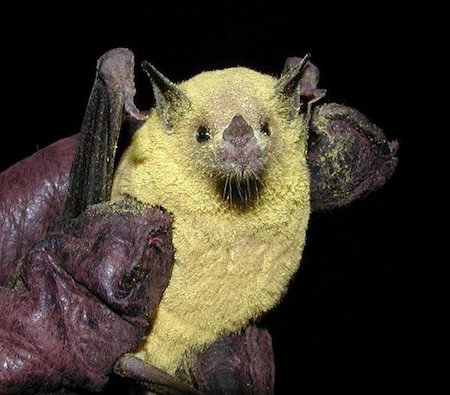
For 250 million years, pollinators have been the planet’s secret agents for sustaining terrestrial life on Earth and many people ignore that over 500 plant species rely on bats to pollinate their flowers. This is a lesser long-nosed bat after a busy night


This is an entirely flat floor. The 16th century optical illusion of Florence Cathedral’s marble tiles.

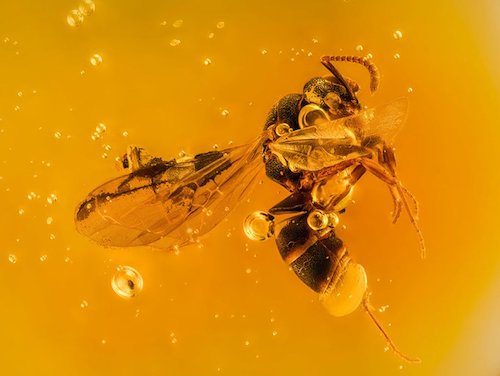
20 million year old winged ant trapped in amber resin captured by Dr. Yuan Ji


Support the Automatic Earth in virustime with Paypal, Bitcoin and Patreon.










Home › Forums › Debt Rattle May 9 2023